Imposing and Opposing 6 o’clock Closing
In 1965, at age 13, I sold evening newspapers standing outside a pub on a busy intersection in Carnegie from about 4.30pm to 6pm. Blokes (and they were all men) used to knock off work and rush to the pub to get in a good hours beer guzzling before the pub shut at 6pm. This precursor to the ‘Happy Hour’ was a mad swarm around all the pubs of Melbourne and became known as the 6 o’clock swill.
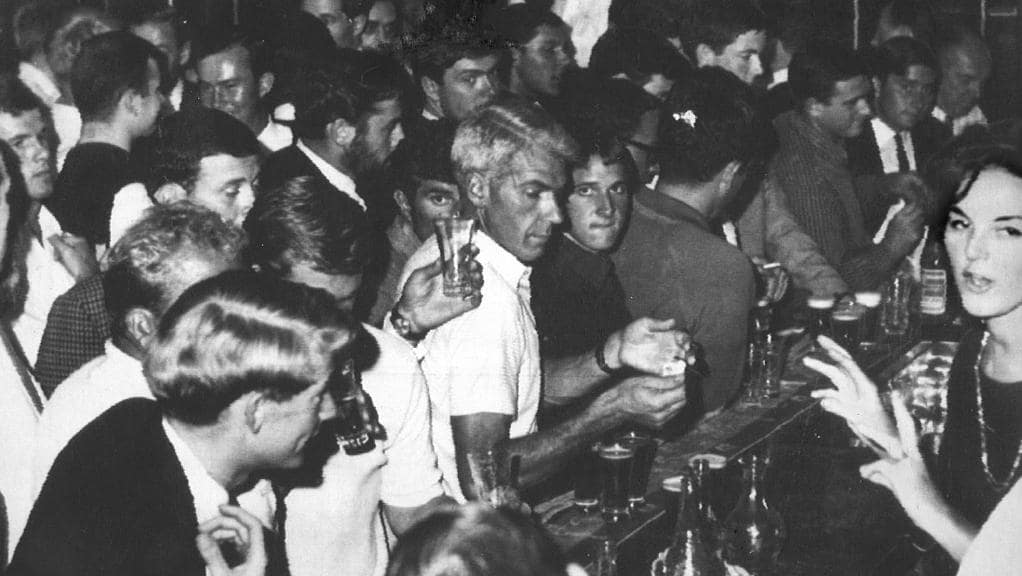
Journalist John Larkin described the six o’clock swill in visceral detail, writing:
ankle deep at 5.30pm in a morass of cigarettes… a howling thirsty mass crawling over each other to demand fifteen beers each to drink in the last, desperate guzzling minutes.
It was an hour-long speed-drinking session, as men raced to drink as much as possible in the limited time available. 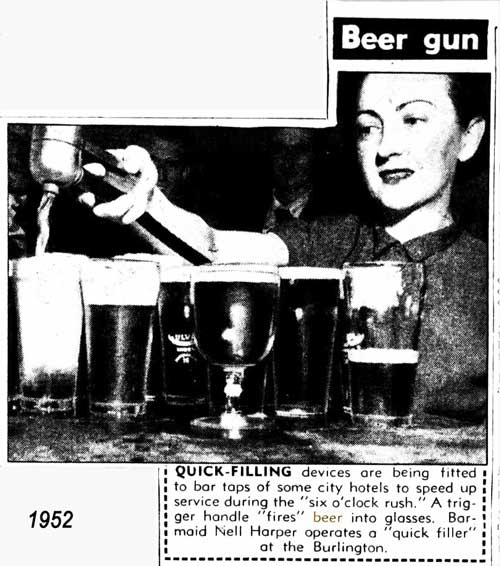 An unintended consequence was that glasses were saved during the hour after quitting time until the last call came for drinks. Then, the emptied glasses could be refilled. The bartender didn’t carry your glass to the tap. He carried a pistol-shaped spigot hitched to a long tube and squirted your glass full where you stood.
An unintended consequence was that glasses were saved during the hour after quitting time until the last call came for drinks. Then, the emptied glasses could be refilled. The bartender didn’t carry your glass to the tap. He carried a pistol-shaped spigot hitched to a long tube and squirted your glass full where you stood.
Commissioner recommends 10pm closing in Victoria
MELBOURNE, Tuesday
The Liquor Royal Commissioner, Mr Phillips. QC, has recommended 10 pm closing of hotel bars and lounges in Victoria. Mr Phillips said that in his opinion no good reason existed against extending normal hotel trading hours for the sale of liquor until 10 pm on all days except Sundays and Good Friday.
In his second report on the liquor industry, tabled in the Legislative Assembly today, Mr Phillips also recommended that:
Liquor be served with meals at hotels and licensed restaurants until 11.30 pm with an extra 30 minutes grace on week days and Saturdays.
A new form of cabaret licence to allow cabarets providing entertainment to sell liquor from 8.30 pm until 3 am week nights and Saturdays, including Sunday mornings. Hotels and licensed restaurants can apply for the licence. No change in present Sunday drinking laws.
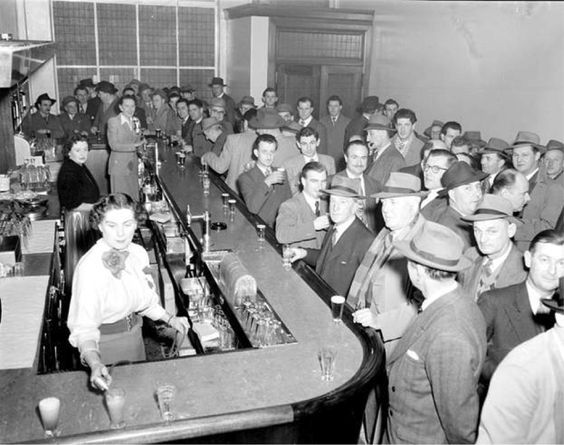
Mr Phillips said:
In particular, I am of the opinion, so far as study the examination of evidence, the consideration of probabilities and the observations of other States in the Commonwealth provide any basis, that no social evil or harm is likely to occur if this change is made in the existing legal regulations.
It appeared that the “swill” — crowding at some but not all hotels between 5 pm and 6 pm — would be relieved if trading hours were extended. At present, when they left work men went in many cases to hotels close to their employment. This was necessary because the time available for “post work” refreshment was too short.
One result of later trading hours in other States has been a transfer of this drinking from the metropolis and from areas close to work, to areas close to the homes of consumers,” Mr Phillips said. If drinking after work and before dinner is to continue. and the ‘swill’ eliminated, it is manifest that dinner must be postponed later than the earliest time now adopted with 6 pm closing.
 Arrangements for dinner
Arrangements for dinner
The arrangement of this domestic timetable is a matter for adult men and women to fix by agreement. In cases where the interests of children seem to dictate some particular or early dinner hour, it must be remembered that 10 pm closing will enable the man of the house to have his dinner and then go to his local hotel for a drink. Broadly speaking, it seems reasonable to assume that in the vast majority of cases men and women will come to a reasonable solution of this minor practicable problem.
Mr Phillips said no evidence was disclosed before him for supposing that greater social evils would result from extending the retail sale of liquor by four hours each day, over and above such evils as might result from the sale and consumption of liquor under existing conditions.
Time for last drink
At present with 6 pm closing, an extra 15 minutes was allowed for final consumption. This should also apply if 10 pm closing were introduced. He also said that hotels should open at 10 am instead of 9 am.
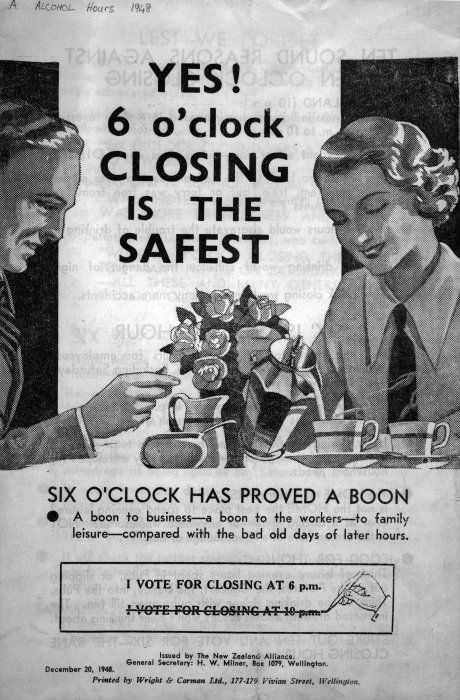 Broadly, he thought the available statistics in Australia supported the view which research elsewhere had indicated, that trading hours — unless they were made very restrictive — did not have any noticeable effect on consumption.
Broadly, he thought the available statistics in Australia supported the view which research elsewhere had indicated, that trading hours — unless they were made very restrictive — did not have any noticeable effect on consumption.
Mr Phillips said:
Western Australia, Tasmania and the Australian Capital Territory, all with 10 o’clock closing, have lower figures for drunkenness per 10,000 of the population than is the case in Victoria, and in the case of Tasmania and the ACT the figures are very much lower. I think it would certainly be safe to say there will be no increase in public charges of drunkenness with an introduction of 10 o’clock closing in this State. It would not be surprising if, ultimately, there were a decrease in the number of charged in proportion to the population. Canberra Times (ACT : 1926 – 1995), Wednesday 28 April 1965
6pm Swill beaten
ADELAIDE, Tuesday
A Victorian police inspector told the South Australian Liquor Royal Commission today that since late closing began in Victoria the “6 o’clock swill” peak rush trading and the overcrowding of city bars had disappeared. He is Inspector B. Clowes, who is attached to the Victorian police division which deals with licensing and gaming work. He assisted the Victorian Royal Commission on Licensing in 1963-64.
He said the ordinary type of city area drinking hotel appeared to have lost business to the larger suburban hotels as a result of late closing.
Entertainment for teenagers
Other points made by Insp Clowes included:
- Provision by some Victorian hotels of entertainment directed towards teenagers, who often availed themselves, of the 10pm to 11.30pm permits.
- Late closing did not appear to have produced any increase in police problems, but bad behaviour resulting from drink was apparent in young men.
- No general public nuisance in the form of drunkenness.
Insp Clowes said there had been no agitation in Victoria for a return to early closing.
Canberra Times (ACT : 1926 – 1995), Wednesday 7 September 1966, page 10
End of the six o’clock swill
FROM OUR CORRESPONDENT IN SOUTH AUSTRALIA
AFTER nearly 18 months of tedious Royal Commissioning and bitter campaigning by temperance interests, poison – to quote former Premier Sir Thomas Playford’s locally, famous phrase -passed into the hands of South Australia’s children (over 21) for another four hours a day as from Thursday night.
In other words, S.A. became the last State in the Commonwealth to abandon 6 o’clock closing by its 859 hotels, 14 wine saloons and 51 licensed billiards saloons.
From Thursday, South Australians could all go on drinking in these places until 10pm for the first time since March 28, 1916, when 6pm closing was introduced as a patriotic self-denying ordinance “for the duration of World War I”.
Canberra Times (ACT : 1926 – 1995), Saturday 30 September 1967
In Queensland This Week – No pies with the beer
By our correspondent
At the close of the stormy 5 day-long debate of anti-picketing legislation last week, the Queensland premier, Mr. Nicklin, rose to his feet with a twinkle in his eye, he announced that the House would adjourn until the following day “when we will debate less controversial matters — the liquor law amendments.”
As in other States, liquor legislation is the target of intense lobbying. Governments must steer a tortuous course through varied opinions. It is impossible to please everybody; the aim is always to displease as few as possible. The regulations which Mr. Nicklin inherited from Labour had one common-sense principle.
There was no “six o’clock swill,” for Queensland hotels had been allowed to trade to 10 pm long before a similar right was conceded even to N.S.W. publicans.
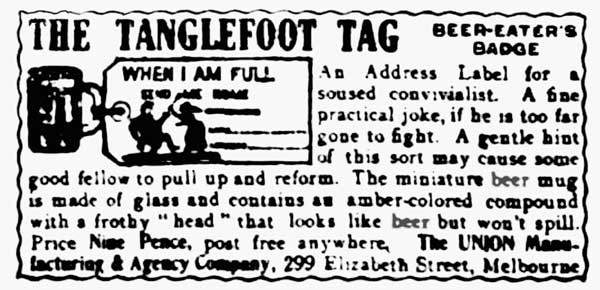
Sunday drinking was governed by the mystical distance of 40 miles. A person who had travelled this distance from the place where he slept on Saturday night could drink at hotels which opened at specified times to serve such “bona fide travellers.”
The Nicklin Government proceeded to wrestle cautiously with these and other anomalies. Caution was the watch-word, and any liberalisation of drinking rules was usually accompanied by a sop to the temperance groups.
Just when the teetotal Premier’s Government cleared the way for licensed restaurants, it created no new liquor licences. Instead it ordered the closure of Queensland’s sometimes sordid wine saloons and transferred their licences to restaurants.
One set of liquor-law amendments gave temperance groups the sop of local-option polls in areas where a new hotel, was planned. In similar fashion, the Government wrote a temperance oriented rider to legislation changing the 40-mile “bona fide traveller” rule. The amendment swept away the old rule, and allowed hotels throughout most of Queensland to trade without restriction from noon to 2 p.m. and from 4 p.m. to 6 p.m. The rider exempted from the amendment all hotels within 40 miles (that distance again!) of Brisbane G.P.O.
The latest amendments, brought down last week, are wide-ranging but still tinged with vote-catching caution.
In debate of the amending Bill’s introductory stages, the biggest controversy centered on the humble meat pie — a fact which no doubt delighted the Government, for pies are nowhere near as contentious as beer.
The hot-pie controversy maintained the best Alice-in Wonderland traditions of Queensland liquor laws.
The Justice Minister, Dr. Delamothe, told the House that major amendments aimed at minimising the effects of alcohol by extending facilities for eating while drinking. Then he stirred a hornet’s nest of Opposition criticism by revealing that hot pies would be banned from hotel bars.
Dr. Delamothe said the amendments provided that only “prescribed foods” could be eaten in bars. “Prescribed foods,” he explained, included materials used in mixed drinks (pickled onions, olives and the like), potato flakes, nuts, cheese, and biscuits or sandwiches provided they were sold in sealed packets.
Pies, fish ‘n’ chips, hamburgers and the like were “out.” At this stage, Independent and former Queensland Labour Party M.L.A. Mr. “Ted” Walsh interjected: “There would be nothing to stop a customer buying a bag of pies down the street and bringing them back.’
Dr. Delamothe countered: “There will be under this Bill.” Mr. Walsh, who was Treasurer and Deputy Premier in the Gair Government, replied: “You will be preventing the worker from having a snack in the bar during his lunch hour.”
One Labour speaker described the bar-room ban on pies as “the most disgraceful thing I have ever heard of.” Another swooped on a statement by Dr. Delamothe that pie-eating in bars was unhygienic — if pie eating was unhygienic, he wondered aloud, was not beer drinking also unhygienic?
The pie controversy drew the spotlight away from other amendments.
The amending Bill permits drinking at balls and dances. This amendment, however, contains the now-inevitable sop to temperance feelings — each ball committee will be allowed only one permit a year for a drinking ball and only certain dance-halls will be considered suitable for the serving of liquor.
Hotels will no longer be required to close while election day polling booths are open. Despite opposition from the Returned Servicemen’s League “old guard”, hotels will be permitted to open from 1 p.m. to 10 p.m. (instead of the normal 10 a.m. to 10 p.m.) on Anzac Day, except where April 25 falls on a Sunday. (Under present law, hotels must close during Federal, State and local authority polling hours and must remain closed throughout Anzac Day).
Several amendments are keyed to Dr. Delamothe’s dine-and-drink ideas and to tourist-industry hopes. Thus:
The hours in which licensed restaurants may sell liquor are extended and such restaurants are permitted to sell spirits, provided the bottles or containers do not exceed 2 ounces.
Licensees at islands and tourist resorts sufficiently remote from licensed victuallers’ sites will be allowed to sell liquor to residents and their guests. Declared tourist areas within a radius of 40 miles of Brisbane G.P.O. will be allowed normal Sunday trading hours. This means that hotels in the Moreton Bay-side city of Redcliff and on Bribie Island will be allowed to open for the two two-hour periods, but other hotels in Brisbane and on Brisbane’s fringe will not.
- Keeping cool for summer, Month, 19??

 Arrangements for dinner
Arrangements for dinner




















